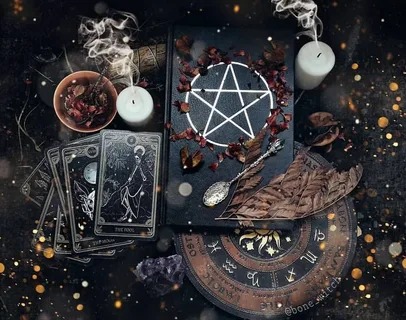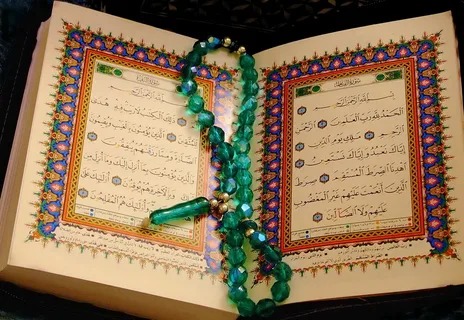Witchcraft, a topic steeped in mystery and intrigue, has fascinated humanity for centuries. Many people turn to religion to seek guidance on this supernatural practice. In this article on Arabian Tongue website, we will delve into what does god say about witchcraft, particularly the Bible, say about witchcraft. We will explore the perspectives of different faiths and aim to shed light on this age-old enigma.
The Christian Perspective

The beliefs of witchcraft differ according to religion, and here we will clarify what the Christian religion says about witchcraft:
1. Biblical References
The Bible, a central religious text for Christians, contains several references to witchcraft. In Exodus 22:18, it states, “You shall not permit a sorceress to live.” This verse demonstrates the severity with which the Bible views witchcraft.
2. The Witch of Endor
The story of the Witch of Endor in 1 Samuel 28 is another significant reference. King Saul sought out a medium to communicate with the deceased prophet Samuel, demonstrating that even biblical figures were not immune to the allure of witchcraft.
3. Deuteronomy 18:10-12
This passage explicitly condemns various practices, including witchcraft, divination, and sorcery, as abominations to the Lord. It warns believers to stay far away from these practices.
The Islamic Perspective
The beliefs about witchcraft differ according to religion, and here we will clarify what the Islamic religion says about witchcraft:
1. Quranic Teachings
In Islam, the Quran is the holy book, and it also addresses the issue of witchcraft. While not as extensive as the Bible, the Quran condemns sorcery. Surah Al-Baqarah (2:102) speaks of two angels sent by God to test mankind and warns against learning magic from them.
Recommend: what are witchcraft
2. Prophet Muhammad’s Warnings
The Hadith, the collection of sayings and actions of the Prophet Muhammad, further emphasizes the prohibition of witchcraft. It is reported that the Prophet said, “Avoid seven destructive sins, including practicing witchcraft.” This underlines the severity of engaging in such activities in Islamic tradition.
Perspectives from Other Religions

Besides the Islamic and Christian religion, there are some other religions that have different beliefs regarding witchcraft:
- Hinduism: Hinduism, a diverse and ancient religion, has a complex view of witchcraft. Some forms of magic, known as “tantra,” are considered sacred and are practiced for spiritual growth. However, black magic and malevolent witchcraft are condemned.
- Buddhism: Buddhism, a religion emphasizing compassion and enlightenment, generally discourages the use of magic or supernatural powers for personal gain. Such practices are seen as distractions from the path to enlightenment.
- Judaism: In Jewish tradition, witchcraft is also viewed negatively. The Torah, the central reference for Jews, warns against sorcery and divination. Leviticus 19:31 states, “Do not turn to mediums or necromancers; do not seek them out, and so make yourselves unclean by them”.
Read more: difference between envious and jealousy
How to Protect Yourself from Witchcraft in the Islamic Religion

In a world where various beliefs and practices coexist, the concept of witchcraft holds a unique place, especially in the context of the Islamic religion. Islam, like many other faiths, acknowledges the existence of supernatural forces, and protecting oneself from the malevolent effects of witchcraft is of paramount importance, witchcraft protection measures are the following:
- The Role of Tawheed: Tawheed, the belief in the oneness of Allah (SWT), is the cornerstone of Islamic faith. Strengthening your belief in Allah’s oneness can provide a powerful shield against witchcraft. The stronger your connection with Allah, the less susceptible you are to the influence of dark forces.
- The Power of Du’a: Du’a is a potent tool in Islamic tradition. Regularly reciting supplications for protection and guidance can create a shield around you, making it difficult for negative energies to affect you.
- Seeking Refuge in Allah: Reciting “A’udhu billahi min ash-shaytan ir-rajim” (I seek refuge with Allah from the accursed devil) is a simple yet effective way to seek Allah’s protection from the malevolent forces of witchcraft.
- Recitation of Surah Al-Falaq and Al-Nas: Surah Al-Falaq and Al-Nas are the last two chapters of the Quran and serve as powerful shields against evil forces. Reciting these chapters regularly can provide a protective barrier.
- Use of Ruqyah (Spiritual Healing): Ruqyah is a form of spiritual healing in Islam. Seek the services of qualified practitioners who can recite specific verses and supplications to heal and protect you from witchcraft.
- The Importance of Regular Salah (Prayer): Regularly performing the five daily prayers is fundamental to a Muslim’s life. Salah not only strengthens your connection with Allah but also acts as a shield against negative influences.
- Maintaining Strong Faith: A strong and unwavering faith is one of the most robust defenses against witchcraft. Continuously work on improving your faith through reading the Quran, attending religious gatherings, and engaging in acts of kindness and charity.
- Keeping Good Company: Surrounding yourself with righteous and pious individuals can provide a protective environment. Good company can help you stay on the right path and ward off negative influences.
- Distinguishing Between Natural and Supernatural Causes: It’s crucial to differentiate between natural and supernatural causes of problems in life. While seeking protection from witchcraft, do not neglect practical solutions to life’s challenges.
- Ruqyah from Qualified Practitioners: If you suspect that you are under the influence of witchcraft, seek help from qualified Ruqyah practitioners who can diagnose and provide appropriate spiritual healing.
- Self-Care and Mental Wellbeing: Taking care of your mental and emotional health is essential. Stress and anxiety can make you more susceptible to negative influences. Engage in activities that promote mental wellbeing.
Learn Now: Arabic Language Kids Course
FAQs
Is witchcraft always considered evil in religious texts?
No, not always. Some religious traditions have sacred forms of magic, but they often draw a clear line between benevolent and malevolent practices.
Can a person be a practicing witch and a devout Christian, Muslim, or follower of another religion?
It depends on the interpretation of their faith and whether they engage in practices that their religion condemns. Some individuals try to reconcile their beliefs, while others choose one path over the other.
Are there modern witchcraft practices that are not condemned by religions?
Yes, some modern witchcraft practices focus on spirituality, self-discovery, and healing rather than harm. These are not universally condemned and are often seen as personal choices.
Can someone be accused of witchcraft in the modern world?
Accusations of witchcraft, while rare in many parts of the world, still occur in some regions. These accusations often have serious consequences, highlighting the need for tolerance and education.
How can one protect themselves from the negative effects of witchcraft, as mentioned in religious texts?
Religious texts often recommend seeking protection through prayer, faith, and adherence to the teachings of one's faith. Seeking guidance from religious leaders can also be helpful in dealing with concerns related to witchcraft.
Conclusion
In conclusion, various religious texts offer insights into their perspectives on witchcraft. While the views may differ, there is a common thread of caution against engaging in practices related to magic and sorcery. The severity of these warnings varies, but they all emphasize the potential dangers and moral implications of witchcraft.


